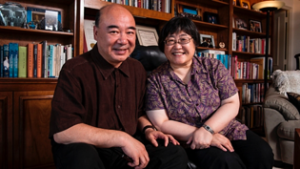Timothy Diovanni concludes his reporting on the Society for American Music conference by joining with Liane Curtis and offering insights on the on the Vivian Perlis Concert in Honor of Chen Yi and Zhou Long. 
Zhou Long and Chen Yi are are Chinese-American composers who were honored with the Society of American Music’s distinguished Honorary Member award. The presentation of the award, and the concert that followed of solo and chamber works by both composers took place on March 2, 2018 and can be heard in its entirety here. The text of the presentation by SAM President Sandra Graham, which can serve as an introduction to the pair and their accomplishments, can be read here. The next morning, a paper session “Transnational Hybridity: Chinese and Western Intersections in the Music of Chen Yi and Zhou Long” – further supported the recognition.
Musicians from the University of Missouri-Kansas City Conservatory performed three works by Chen and two by Zhou at St. Paul’s Episcopal Church. Their execution demonstrated artistic refinement and spirited energy.
Chen Yi’s Chinese Folk Dance Suite (2001/2017) is for soprano saxophone and piano (adapted from the original for violin and orchestra by Tak Chiu Wong). In three sections, it begins with “Lion Dance” and a tempestuous soprano sax solo performed by Chi Him Chik, followed by double and flutter tonguing. The virtuosic articulations were crisp and spirited. Pitch sets and rhythms in this first dance drew inspiration from folk influences. In “YangKo,” the pianist, Hao Yin, acted like a percussionist, tapping on the left rim of the instrument. Throughout “Muqam,” interplay between Chi Him and Hao fueled a fiery verve. (here on Youtube)
This was the world premiere performance of this new arrangement, and it will undoubtably serve to bring this exciting work to wider audiences.
Zhou Long’s Mongolian Folk Tune Variations was performed by Xueli Liu, piano. The theme is presented as a mournful melody, a wistful, short and simple, supported with arpeggiations. The texture then becomes more elaborate — at one point, the tune is surrounded with billowing filigree of triplets, but then the next variation is more tempestuous, adventurously straying from the tonal center. The form expands as new melodies are built on elements of the original tune. Continuing with lush, impressionistic color, it then built to a resounding, majestic conclusion – so I thought – but after the rich chord died away the theme returned yet again, delicate and distant, already becoming a fleeting memory. It was a warm and deeply expressive performance. (here on Youtube)
In Chen Yi’s Ba Ban (1999), Zueli Liu was again the soloist. The opening scattered lines sounded like light rain. In this texture, folk-inspired melodies briefly surfaced. Near the end of the work, a bass ostinato rumbled. Soon after, the soloist swept into her instrument’s upper register and softly executed an insistent figure. Ba Ban ended with an upward, pointillistic flourish. (here on Youtube)
Jing Marimba (2009), by Chen, began in a pleasantly joyful mood. Melodies unfolded in descending sequences and syncopated accents jutted out from smooth lines. The middle of the piece had a playful and quirky character. Twists and tumbles and trills collided whimsically; it’s music that can’t take itself seriously. Intermittently, Christopher Larson, the marimbist, played foreboding block chords, punctuating the jocular atmosphere. After the introductory melody returned, the music floated softly and swiftly away. (on Youtube)
The evening concluded with Zhou Long’s Taiqu Rhyme (2003) for clarinet, violin, cello, and three percussionists (Laura Zitelli, clarinet; Elaine Ng, violin; Esther Seitz, cello; Derek Frank, Elizabeth Kosko, and James Taylor, percussion; Nicholas Petrella, conductor). This work features a brisk driving rhythm – the strings join the percussion in pure energetic rhythmic drive. The clarinet enters with shrill piping. The momentum is broken by a mournful wail of the clarinet, and but the energy builds again with vigor. Again the clarinet ends the section with a poignant cascading outcry. Then the tone is subdued and hushed. Gradually the sections of the work build in energy to a frenzy – the Chinese equivalent of a bacchanal? This was a virtuosic showcase for all involved but particularly the clarinet and three percussion players. (here on Youtube)
This was an excellent concert and demonstrated the brilliance of the musical idiom of both the honored composers.
For further study we recommend Jennifer Kelly’s In Her Own Words: Conversations with Composers in the United States, which includes an interview with Chen. Also, Leta E. Miller and J. Michele Edwards, who both presented analyses of Chen’s music as part of the paper session, have a book forthcoming with the University of Illinois Press (we will definitely post on that when it is available!) Chen Yi’s music is published by Theodore Presser. Zhou Long’s music is published by Oxford University Press.
